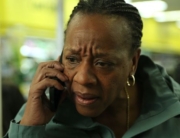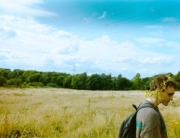Lebanese director Mounia Akl makes an auspicious feature debut with Costa Brava, Lebanon. She has set herself an imposing goal of combining political commentary and an intimate character study with flecks of surrealism. Although it doesn’t quite come off, there are moments of ringing insight and exhilarating artistry scattered throughout.
It’s set in the near future (although it might as well be, for all intents and purposes, today) in the countryside outside Beirut, where the Badri family has lived, off the grid, in a secluded compound for the past several years. That was when father Walid (Saleh Bakri) decided that the stresses of modern life, pollution and other environmental problems, and his activist protests against a corrupt government were too much to bear, hence the move. With him are his wife, Souraya (Nadine Labaki), a former pop singer whom Walid met at a protest; their teenage daughter, Tala (Nadia Charbel); Walid’s aging mother, Zeina (Liliane Chacar Khoury); and their youngest daughter, Rim (Ceana and Geana Restom), who has only known this seemingly idyllic existence.
However, any sort of family idyll is soon trashed, literally: The Badris are informed that the property right next to theirs has been designated as the new landfill for—get this—the entire country. (Environmentally safe, they are promised.) Akl is obviously referring to an actual crisis in Lebanon in 2015, when a temporary landfill was finally closed after nearly two decades and garbage piled up in streets throughout the country after the trash contractor refused to collect it, igniting organized protests nationwide.
Although the Badri family’s attendant problems with the new landfill are very real—ruinous runoff, piles and piles of trash, foul stench, for starters—the director treats them as rather clunky metaphors, an unnecessary contrivance in an otherwise urgent family drama. Of course, the landfill’s appearance renders Walid’s reasons for escaping the city moot virtually overnight, as well as triggering behavioral changes among family members.
Zeina sort of flirts with one of the overseers of the landfill, bumming a cigarette off him and asking him to track down a new cell phone for her. Seventeen-year-old Tala has her eye on the landfill’s young foreman, going so far as to try and seduce him—unsuccessfully. Young Rim begins to understand that her life in the “wild” (and the only home she’s known) may be coming to an end. Souraya, though, has always felt out of place far from the city, and the tensions between her and Walid become more prominent, especially as he realizes that all of the females in his home are asserting their agency at the expense of his own patriarchy.
Indeed, the most memorable moments in Costa Brava, Lebanon concentrate on how this situation has created a constantly shifting family dynamic, with Akl’s direction brimming with invention and—in flights of fancy—a light, surreal touch. A dejected Walid looks at the landfill one night and imagines seeing brightly lit garbage bags rising into the sky, while Tala fantasizes about the foreman near the family pool. Akl also elegantly introduces more pertinent and specific symbolism than the landfill itself: the resulting underground pollution has turned the water in the faucets and the outdoor pool red, its brightness a visual and—to the family—emotional shock to the system.
Superb acting by the entire cast and Akl’s confident directing help smooth the bumpy patches (the final shot is especially powerful and tantalizing) and make one look forward to what this talented filmmaker will do next.

















Leave A Comment